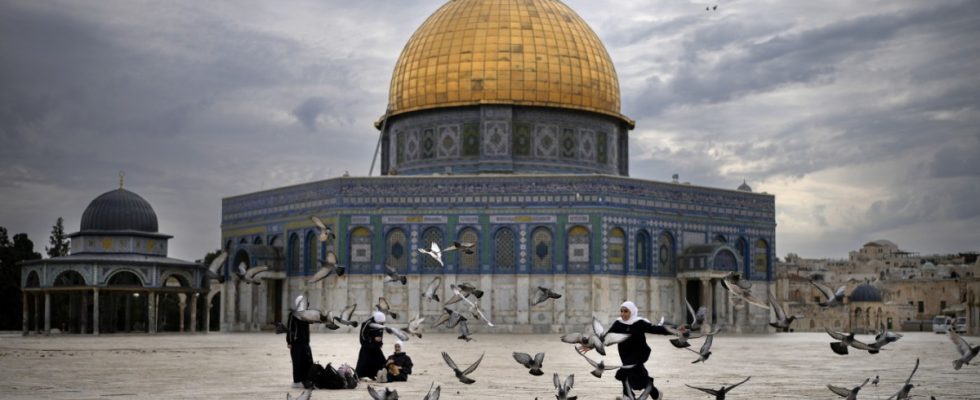Ramadan. Hardly any other word seems to be as pregnant with meaning in Israel at the moment as this one. Over the weekend, Israeli media reported that an agreement on the release and return of the 134 living and dead hostages could be reached before the start of the Muslim fasting month around March 10th. At the same time, the right-wing extremist Minister of National Security Itamar Ben-Gvir threatened to restrict Muslim access to the Temple Mount in the Old City of Jerusalem during Ramadan “for security reasons.”
Jerusalem plays a central role for devout Muslims during the month of fasting. The Temple Mount with the Dome of the Rock and the Al-Aqsa Mosque is the third holiest site in Islam. Tens of thousands are expected in Ramadan at al-Haram al-Sharif, as Muslims call the Temple Mount. Many Muslims also regularly come to the pilgrimage site to pray on Friday prayers. Age restrictions on entry to the Al-Aqsa Mosque are routinely applied to Palestinians from the West Bank and East Jerusalem who are not Israeli citizens in times of tense security.
Opposition leader Lapid criticizes the possible restrictions
At midday on Friday, a young man with a colorful prayer rug over his shoulder stands in front of Israeli police officers. He wants to pray, he says, “is that too much to ask?” He looks into the eyes of the police officers who stubbornly refuse him entry. In a few minutes the Friday prayer begins in the Al-Aqsa Mosque, the young man will miss it. Israeli police officers and soldiers are positioned everywhere in the Muslim quarter and at the entrance to the Temple Mount, they are checking Palestinians; young men in particular have to turn back this morning. Why are they rejected? In response to a request, the Israeli police said they were “committed to providing a safe environment for all citizens all year round, regardless of race, gender or religion.” And: “Any attempt to paint a different picture” is “a distortion of reality.” However, it is quite possible that the young Palestinian men will have to turn back because there was a terrorist attack the day before in which three Palestinians killed an Israeli and injured several others.
After Research by the New York Times Israel has long restricted access to the Al-Aqsa Mosque for Palestinians from the Israeli-occupied West Bank and has imposed additional restrictions on Arab citizens and residents of Israel since the start of the Gaza war. The assumption behind this is that the tense situation in the conflict over the Gaza war could erupt into violent clashes in Jerusalem at any time. Only recently, Security Minister Ben-Gvir called for tightening and further restrictions for the fasting month. Benjamin Netanyahu’s office later said the prime minister had made “a balanced decision” that allowed religious freedom “with the necessary security limits.” The office has not yet published any details. Media reports mentioned age and residence criteria. A requirement like last year is conceivable: only men aged 55 and over, women and children up to the age of twelve do not need a permit.
Opposition representatives criticized the possible restrictions. Already warned at the beginning of February Opposition leader Jair Lapid on Platform X: “If Ben-Gvir oversees events during the Islamic fasting month, the area will go up in flames.” Itamar provoked Ben-Gvir several times by visiting the Temple Mount, where, according to biblical tradition, the First and Second Temples were said to have stood. The so-called Western Wall below the Temple Mount esplanade, on which the Dome of the Rock and Al-Aqsa Mosque are located, is the Western Wall, sacred to Jews.
Many Palestinians have lost their jobs in Israel since October 7th
On the Temple Mount, which Israel captured in the 1967 Six-Day War, there are repeated clashes between Israeli security forces and Palestinians who fear that the historic status quo of the holy site could be called into question. The Temple Mount is under Muslim administration, while Israel is responsible for security. Under an agreement with Muslim authorities, Jews are allowed to visit the site but not pray there. Violations of this agreement continue to occur. In 2000, a visit by then-Israeli opposition leader Ariel Sharon sparked unrest that led to the years-long Second Intifada. Last year there were also violent clashes during Ramadan. In 2021, Israeli police raids on the Temple Mount led to a brief war between Israel and Hamas.
Will police control help? Some observers are concerned that entry restrictions could infuriate the Muslim world and warn. “Experience shows that the situation often escalates when the police restrict access for Muslims,” says Aviv Tatarski from the Israeli, left-leaning NGO Ir-Amin, which aims to make Jerusalem a fairer and more sustainable city for Israelis and Palestinians. Raids and restrictions would usually not end well. “On the contrary: they usually backfire,” says Tatarski. Economic factors have also fueled discontent among Palestinians: many have lost their jobs in Israel and thus their livelihoods since the Hamas massacre on October 7th. “The situation is tense,” said Tatarski.
Violence also occurs again and again during Friday prayers
How tense the situation is in Jerusalem’s Old City can also be seen this Friday morning before prayer. Within a few moments the situation threatens to escalate. Suddenly, several Israeli police officers rush towards a Palestinian who has already been cornered and kneeling on the ground. Shortly afterwards, a Palestinian can be seen refusing to turn back. A soldier takes his baton and strikes, in the end both are injured.
The young man with the prayer shawl, who was denied entry, is now standing in a narrow alley and watching the controls. “In Ramadan we will see,” he says, “whether the situation escalates or not.” Then he sets off to find another entrance to the Temple Mount. He hopes, he says, that there will soon be a ceasefire in Gaza and that “peace will finally return.”

